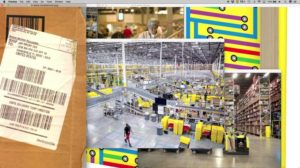Amazonia is Columbus, Ohio-based filmmaker Roger Beebe’s new experimental documentary about the physical places where Amazon packages are stored, processed, and delivered, and he’s bringing it to this year’s Antimatter film fest here in Victoria.
Since 2007, Beebe has been exploring what he calls a “multi-projector performance,” where he uses up to eight projectors working in harmony to create a trippy collage of experimental footage. Beebe tries to bring this idea into Amazonia by presenting it as a “desktop cinema,” a film told from within the desktop of his Mac.
“You’ve got this terrain that’s set for you, and then you decide how you array the windows and the volumes, and you get rhythmic possibilities that you don’t have in single channel,” says Beebe. “Thematically, the most important thing about it was just really thinking about the computer interfaces, like how I really accessed that world that I’m talking about, this sort of concrete physical world where the distribution centres are located. It felt important to pass through that portal to experience that footage. I had played with other versions of it that just presented the original Super 8 footage and 16mm footage full frame. There’s something that just felt really wrong about it, and it really seemed to resolve that when I recontextualized all that stuff in the computer space.”

Watching Amazonia, you’d think it was done all in one take, but Beebe says that it’s more complicated than that. If you’ve ever experienced the frustration of having too many tabs open on your web browser, trying to record this style of film would be your living nightmare.
“There are [cuts] but there are big chunks where I had to learn to perform it, and so I would do one chunk until I had a swipe to a new clean desktop,” says Beebe. “I’ve done it for a couple of my recent works and I’m really interested in being in that space about the compositional possibilities of the multi-projector, multi-window environment of the desktop.”
Beebe says that the first presentations he did of Amazonia were in a couple different forms, including trying to perform every mouse click live.
“[It was] an impossibly stupid thing to have tried,” he admits, “but I tried to preserve some of that liveness in the recorded version.”
Amazonia highlights many unsustainable business practices used by Amazon, even though Beebe himself admits to shopping there occasionally.
“The truth is my girlfriend has an Amazon Prime membership and I do take advantage of it from time to time,” he says. “In fact, for a new four-projector installation that I’m installing on Thursday, I had to buy these motion sensors on Amazon. I don’t shop more there than I have to, but I do seem to have occasion to buy something there every month or two if there’s some weird little doodad. We’re all inhabiting these contradictions… We all want to do better, we all want a world that is more just, and humane, and green, and all of these things, but we also depend on airplanes and cars and factories in southeast Asia and all this other stuff. You don’t just watch a 24-minute documentary and then you’ve solved the problem, you know?”
Going into the film, Beebe would like viewers to keep in mind that this isn’t an activist documentary “in the sense that it prescribes a program.”
“I hope at least this information is in there so people can make consumption decisions,” he says. “I don’t want it to be a lecture, so I do hope it’s informative and I do hope it’s also an experience. I hope that viewers will not reduce it to its content.”
By no means is Amazonia a conventional documentary—the form is made to complement the content, almost like poetry. And, like some poetry, this story is open-ended.
“After finishing the film, it feels like every week there’s a new article that makes me want to add a new chapter to it, you know. There’s a sort of crazy twist about Amazon now sub-contracting… They ended their relationship with FedEx and now they’re hiring private drivers to insulate them from any responsibility in case the drivers get into a wreck and kill somebody,” says Beebe. “I’ve seen drivers in my neighbourhood driving rented U-Haul trucks delivering Amazon packages. So it feels like every week there’s a new story like that… Keep your eyes peeled for the sequel.”
Antimatter
Various times, Wednesday October 16 to Saturday, October 26
Various prices and venues
antimatter.ca
